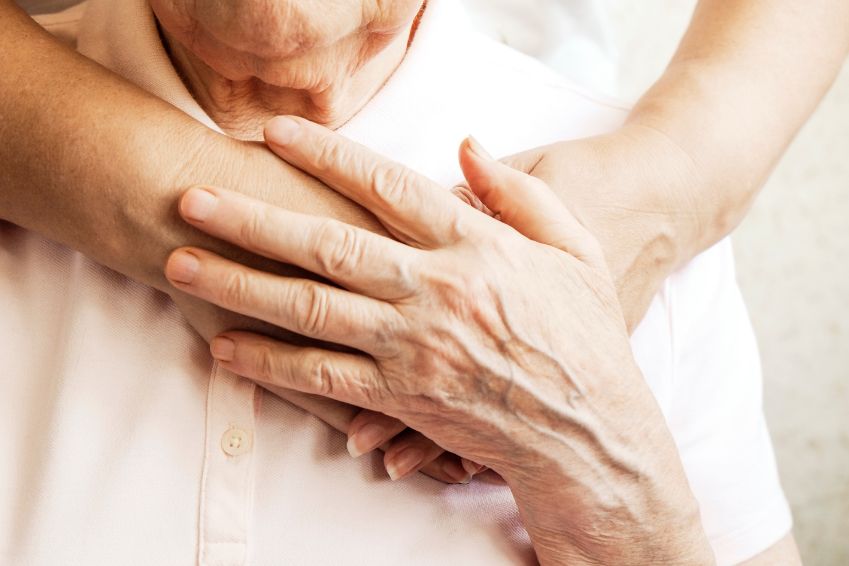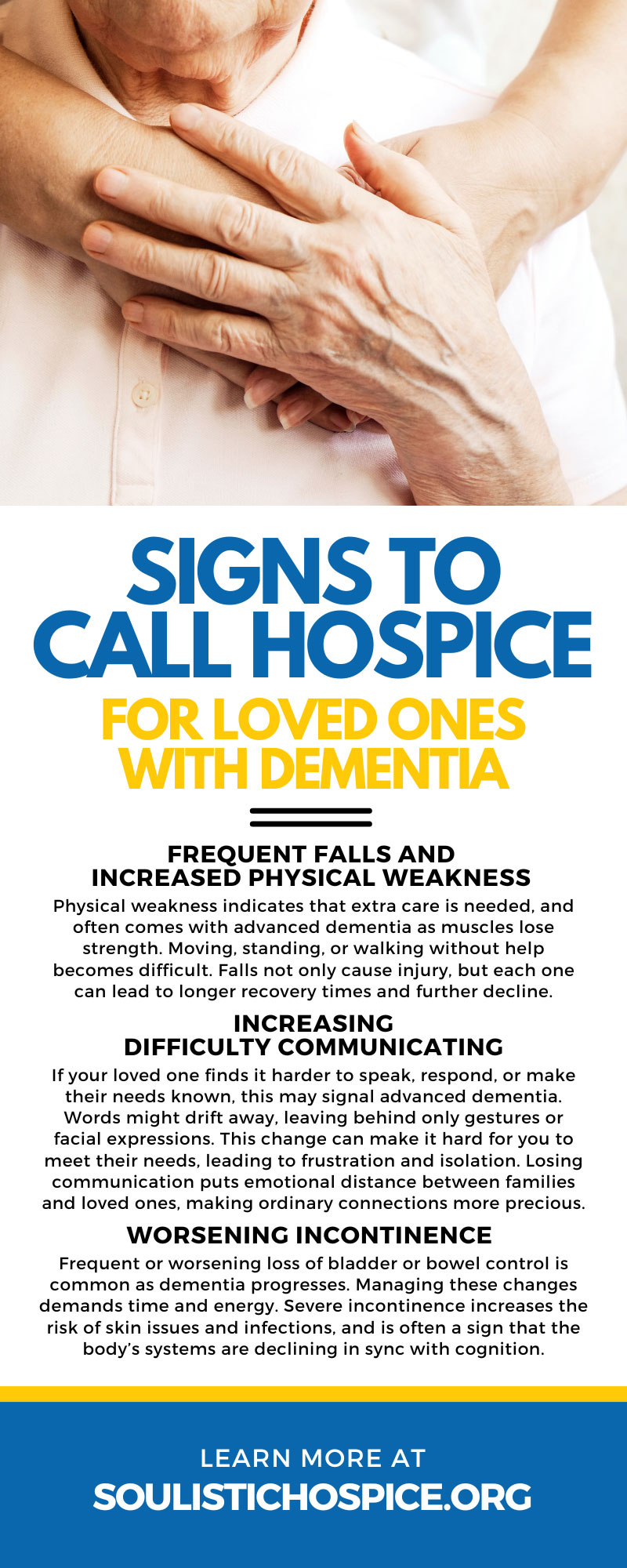
Caring for a loved one with dementia is a path full of love, worry, and countless decisions. Recognizing when it’s time to consider hospice is one of the most important steps on this path. This decision isn’t a sign of giving up but rather a compassionate step that brings comfort and peace during a challenging stage.
We’ll help you understand this condition’s impact and share the ten signs to call hospice for loved ones with dementia. Caregivers and family members can ensure their loved ones receive the support and dignity they deserve by tuning into these changes.
Understanding Dementia
Dementia is a general term for a decline in mental ability that’s severe enough to interfere with daily life. It affects memory, thinking, judgment, language, and behavior. Alzheimer’s disease is the most common form, but dementia can result from many diseases and conditions.
It’s heartbreaking for families to watch these changes in someone they love. Daily routines become difficult, and needs can increase as the illness progresses. Over time, dementia can lead to physical decline, making it hard for people to move, eat, and communicate. This complex condition brings physical, emotional, and spiritual challenges for everyone involved.
Signs It’s Time For Hospice
Often, patients living with dementia reach a stage when curative treatment is no longer effective or appropriate. At this point, hospice offers gentle comfort and dedicated support. Knowing when to seek hospice isn’t always clear, but these ten signs can help you make this decision with confidence and care.
Frequent Falls and Increased Physical Weakness
Physical weakness indicates that extra care is needed, and often comes with advanced dementia as muscles lose strength. Moving, standing, or walking without help becomes difficult. Falls not only cause injury, but each one can lead to longer recovery times and further decline.
Difficulty Eating, Leading to Significant Weight Loss
Many individuals with late-stage dementia struggle with chewing, swallowing, or recognizing food. Eating becomes a slow and sometimes distressing process. These difficulties can cause significant weight loss and frailty. Malnutrition and dehydration follow, making the person more vulnerable to illness.
Increasing Difficulty Communicating
If your loved one finds it harder to speak, respond, or make their needs known, this may signal advanced dementia. Words might drift away, leaving behind only gestures or facial expressions. This change can make it hard for you to meet their needs, leading to frustration and isolation. Losing communication puts emotional distance between families and loved ones, making ordinary connections more precious.
Worsening Incontinence
Frequent or worsening loss of bladder or bowel control is common as dementia progresses. Managing these changes demands time and energy. Severe incontinence increases the risk of skin issues and infections, and is often a sign that the body’s systems are declining in sync with cognition.
Recurrent Infections
Repeated urinary tract infections, pneumonia, or other illnesses may indicate the body is growing weaker and less able to fight disease. These infections become harder to treat and may take longer to recover from or cause a noticeable decline. Each recurrence makes daily life more difficult and places extra strain on caregivers. The presence of frequent infections is a turning point in considering hospice care.
Noticeable Decline in Cognitive Abilities
You may observe confusion and memory loss worsening by the week, not the month. Your loved one may struggle to recognize familiar faces, forget long-time routines, or have trouble understanding their surroundings. This rapid decline means daily tasks become impossible without ongoing support. At this stage, specialized care can provide needed comfort and safety.
Increased Need for Assistance With Daily Tasks
Regular help with bathing, dressing, and eating becomes necessary. Even sitting up or moving in bed may require assistance. When your loved one’s independence vanishes and total care is needed, their comfort and dignity become top priorities. Hospice professionals understand these needs and provide respectful, skilled support at every step.
Withdrawal from Social Activities
Your loved one may avoid favorite hobbies or stop engaging with friends and family. They might retreat to their bed or a quiet corner, seeming far away even when present. This withdrawal can stem from exhaustion, confusion, or a reduced ability to participate. Social isolation signals not just emotional decline, but also deepening physical and cognitive changes.
More Frequent Hospitalizations
If you are taking your loved one to the hospital more often—for falls, infections, or other complications—it’s a sign their health is fragile. These hospital stays can be disorienting and lead to more confusion or setbacks. Multiple hospitalizations in a short span suggest a higher level of care is necessary. Bringing hospice into the picture can help you avoid unnecessary trips and make care at home more comfortable.
Expressed Wishes for Comfort and Peace
Some people with dementia, even when they can’t express themselves clearly, show that they want tranquility over more tests or hospital treatments. Family members may hear requests for “no more hospitals” or statements about wanting to stay at home. Honoring these wishes is a loving act. Hospice care at home focuses on comfort, dignity, and peace during life’s closing chapter.
What To Do Next: Call Soulistic Hospice
Recognizing these signs can be overwhelming, but compassionate support is available. Hospice services like Soulistic Hospice bring medical expertise, comfort, and peace of mind during a difficult season. When you call Soulistic Hospice, your loved one gains access to a dedicated, nonprofit team known for its loving care and outstanding professionalism. You will work with skilled nurses, doctors, and caregivers. Soulistic Hospice’s approach goes beyond basic needs, addressing the whole person—including emotional, spiritual, and cultural elements—to make each moment as meaningful as possible.
Soulistic Hospice tailors every service to your loved one’s needs, from help with bathing, dressing, and daily personal care to expert hospice medical care. Our team responds 24/7, so family members never have to face emergencies alone. Soulistic Hospice also guides families through decisions about comfort-focused care, ensuring your loved one lives out their remaining days with dignity and surrounded by compassion.
Providing Comfort, Dignity, and Support at Every Step
Hospice care is one of the greatest acts of love a caregiver or family member can provide. Watch for these ten signs to call hospice for a loved one with dementia to give them the best chance at a peaceful, comfortable transition. Hospice is not about giving up hope but shifting that hope toward comfort, meaning, and connection in the days ahead.
If you recognize these signs in someone you love, don’t hesitate to seek help. Soulistic Hospice offers expert, holistic hospice medical care with dignity and compassion at its core. Give your loved one the peace they deserve, and yourself the support you need. Contact Soulistic Hospice today for support, guidance, and gentle care every step of the way.









